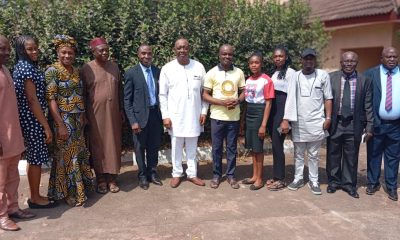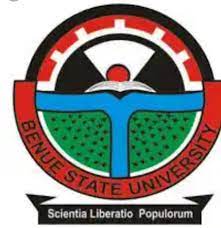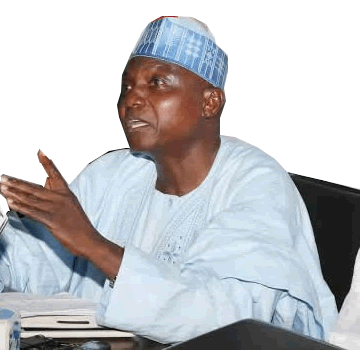FEATURES
Governor Mutfwang’s One Year of Refreshing Air on the Plateau

By Jude Dangwam
The collective aspirations of Plateau people as demonstrated in March 18, 2023 gubernatorial election that saw the emergence of Barr Caleb Manasseh Mutfwang as the Governor of Plateau State and further affirmed by the Supreme Court of Nigeria has clocked one year in office today.
It is obvious that Plateau people did not make a mistake in voting Governor Caleb Manasseh Mutfwang as their leader after eight years of stagnation and leadership gap created between the people and the then All Progressives Congress (APC) administration in the state.
Since his inauguration on May 29, 2023, Governor Mutfwang has left no one in doubt as to his mission in the state- changing the narrative of Plateau to the delight of citizens of the state despite the burdens of insecurity, bankruptcy of the state inherited from the last administration of Simon Bako Lalong.
Owing to his commitment to fulfil his campaign promises has earned him the name “Talk And Do Governor” by citizens of the state..
On assumption of office, Governor Mutfwang met a demoralised civil service on strike with four months unpaid salaries amounting to over N11 billion. This debt was cleared within few months in office and he has continued with prompt payment of wages and gratuity of public servants.
To get workers satisfied and productive, Plateau State Governor, Barr. Caleb Manasseh Mutfwang is committed to cultivating a collaborative bond with all labour unions to fortify the civil service and ensure efficient service delivery to the people of Plateau.
He has repeatedly re-echoed that payment of salaries is never an achievement but an obligation as “a labourer is worthy of his wages”, Civil servants have never had it so good since he came on board.
Interestingly, Plateau is up-to-date in the payment of salaries and also has commenced payment of pension, gratuities and death benefits arrears from 1986 to date. He has ordered for upward review of monthly pension from N5,000 to N20,000 with effect from January, 2024.
During the campaigns for election, he stood on the fact that he will not sack any worker who was duly employed in line with the civil service rule, rather he would create room for more employment, particularly of young persons.
Even for the fact that he was misconstrued for terminating the employment made by the immediate past government, he stayed true to his words and went ahead to verify the process to ensure credibility and fairness. At the completion of the verification exercise, 3,879 workers were found employable after strenuously going through the list.
Governor Mutfwang has shown human face and determined to empower Plateau youths irrespective of faith, ethnic and political affiliation. He has injected the new workers into the service for efficient service delivery to the development of Plateau.
These are interesting scenarios taken into account that government after another has come and gone without any of them taking the gauntlet to address the issue. Over the years, many pensioners have taken ill, while some have died as they waited for their pension and gratuities.
He has also implemented hazard allowances for medical doctors, nurses and health workers, coupled with his interventions for the accreditation of courses mainly in the state owned tertiary institutions. No wonder, he has been adjudged by the Nigeria Labour Congress as civil servant friendly-Governor.
His harmonious working relationship with leaders of joint unions was cultivated in the interest of peace and development of Plateau. No wonder, he has taken time to meet with the unions’ leadership to explain position of government regarding these critical areas.
Governor Mutfwang in an effort to motivate the civil service, has continued with the implementation of N30,000 minimum wage and an approval of N12,000 to each civil servant as palliative for fuel subsidy removal.
Knowing that the state is noted for agricultural production, he has prepared well for the farmers generally. He has secured over 200 trucks of fertilizers and distributed at subsidized rates to farmers in the state.
Aware that some communities are being invaded by armed bandits, and as such might find difficulty in accessing their farms, the governor has not lost sleep to ensure that security is available to protect farmers in their communities to enable them sustain agricultural productivity..
Apart from the distribution of grains and other household items for indigent citizens in the state, Governor Mutfwang has procured 15 luxurious buses designated for strategic routes within the state to ease cost of transportation for citizens. He has resuscitated the moribund rail transport system within Jos- Bukuru Metropolis. All these was to boost the state’s economy and improve the standard of living of the people.
On infrastructure in the state, despite facing huge security challenges and legal disputes that initially hindered the smooth commencement of his administration, Barr Mutfwang, has remained steadfast in addressing the state’s challenges and delivering democratic dividends across all sectors of the economy.
Mutfwang, the workaholic governor has remained the people’s hero by setting up construction sites all over the state. Having met most roads in some parts of the metropolis in a total state of disrepair, he initiated action to take those head on by fixing them almost at the same time. By that singular action, his name would for long remain on the lips of the people of the state; who have always identified with the government that works for them.
Few days after the Supreme Court victory, the governor mobilized several construction companies to some of the most important projects, which were started by former Governor Jonah David Jang but abandoned by Governor Simon Bako Lalong’s government in 2015 to the end of his eight- year tenure.
The lead was instructive, forge ahead and concentrate on developing the state at all cost, without minding if he had any case in court at all. For starters, he became governor during one of the toughest times in the history of the state.
Muscled from all sides by a determined opposition to wrest power from the ruling APC and the genocidal attacks, which became more pronounced in his local government of birth, Mangu would have slowed his resolve to be the leader the state needed.
Within one year in office, Governor Mutfwang has demonstrated resilience, commitment and strong leadership qualities that endeared him to Plateau people. He is marching forward towards uniting Plateau people across the divides of faith and ethnicity. He is building a united and prosperous Plateau that is the dream of all.
The Governor has embarked on the transformation of the state capital with the Metropolitan city wearing a new look with various road networks as well as the introduction of monthly sanitation which was long forgotten.
The Plateau State Environmental and Sanitation Agency (PEPSA) and Jos Metropolitan Development Board (JMDB) through instrumentality of the Executive Order 003 has embarked on total overhaul of the Jos – Bukuru Metropolis to reclaim it’s original Master Plan towards a beautiful city that was known before.
Various shanties, street traders at the Central Business area of Taminus and Bukuru market, traffic control especially within the metropolitan city has vanished with stiffer penalties giving birth to fresh air in the state capital.
The General Manager of the Jos Metropolitan Development Board JMDB Arch Hart Bankat had earlier disclosed that violators of traffic rules will face strict penalties, including fines and vehicle impoundment as they implement the Executive Order 003.
“We believe that by enforcing this executive order, we can improve the quality of life for all residents of Plateau State and create a safe and organized urban environment. We urge all residents to cooperate with the authorities and adhere to the provisions of Executive Order No. 003, 2024” he stated.
Inline with open and transparent governance, the Mutfwang administration in fulfilment of his commitment to accountability to the electorate that overwhelmingly voted him into office, the Governor approved a Ministerial briefing for all Commissioners to give their scorecards before the people of Plateau State.
The Ministerial briefing led by the Commissioner for Information and Communication, Hon Musa Ashoms is aimed at holding government accountable by citizens.
Ashoms noted that the civil service is the engine room of government where various bureaucracy of government takes place towards the translation of government policies and programs into physical look to be felt by citizens.
“You can be sure that a lot of the paper work takes place in the Ministries, Departments and Agencies (MDAs) before the physical manifestation of such efforts. Today, we behold the first set of these MDAs that will provide insights into what the administration has done in its first year.
“This gesture highlights his readiness to provide the tonic for the reactivation of the machinery of government in all of its departments. It is this attitude that drives the vigorous activities across various sectors and across the state, turning it into a huge project site for massive infrastructural development and an incubator for robust public policy initiatives.”
The Governor has sponsored 540 out of 1,232 pilgrims from Plateau for this year’s Hajj to Saudi Arabia for the annual religious rituals after clearing a backlog of N155million for deposits for intending Pilgrims’ that was misused by the previous administration of Simon Bako Lalong.
The Executive Secretary of the Plateau State Muslim Pilgrim Welfare Board, Alhaji Daiyabu Dauda disclosed that without the intervention of the Governor, the 2024 Hajj wouldn’t have been a success story.
“Hajj is one of the fifth pillars of Islam which is prescribed upon every Muslim who has the privilege and freedom to embark on it once in their lifetime.
“Without the approval and release of N155 million funds to clear the inherited backlog, many of the intending Pilgrims could not have been here today for the 2024 Hajj.
“The State government secured a Bank loan of N2 billion to enable the Board obtained the needed number of Hajj slots from the National Hajj Commission of Nigeria (NAHCON) before the intending Pilgrims from the state made their deposits.
“The State Government has been paying the interest on the loan. We have paid about N1.6 billion now, is just N4 million left, which by the grace of God we will clear after we return,” he explained
The one year developmental stride by the Mutfwang administration has impressed even the opposition party – APC in the state as stated by the factional state Chairman Hon. Ishaya Itse. Putting party differences aside he said the performance of Governor Caleb Mutfwang of the PDP could not be compared to the first four years of his party in the last administration.
“As APC Chairman in the state, I am in a vantage position to educate people on the achievements of my party the APC. Sorry to reveal that the one year in office under governor Lalong. Our celebration was practically paper work not practical for the citizens of the state to see as it is in the case of the Mutfwang’s administration that you can see, feel and touch.
“The time for politicking is over, now is time to give the dividend of democracy to the people of Plateau State who queued under the scorching sun to elect leaders they thought would savage them from poverty and other inhuman vices,” he stated.
FEATURES
The GMO Debate in Nigeria: Concerns over Safety, Regulations

A nationwide rally against Genetically Modified Organisms (GMOs) in Nigeria has brought to the fore the concerns of experts over the potential health and environmental risks associated with the introduction of the organisms into the country’s food system.
The rally, led by the Health of Mother Earth Foundation (HOMEF) in collaboration with the GMO-Free Nigeria Alliance and civil society organisations took place on December 13 in major cities across the country.
According to the conveners of the rally, the outing is aimed to raise awareness about the dangers of GMOs and to pressure the government to reconsider its decision to approve genetically modified foods in the country.
The World Health Organisation (WHO) describes GMOs as organisms whose genetic material has been altered using genetic engineering techniques.
The alteration, according to the international health agency, involves the use of biotechnology to introduce genes from one species into the DNA of another species, creating a new organism with desired traits.
Therefore, genetically modified foods are foods that have been altered using genetic engineering techniques.
At the heart of the controversy is the claim by proponents of GMOs that they can help address food insecurity in Nigeria.
They assert that crops can be engineered to be more resistant to pests and diseases, reducing losses and increasing yields.
One of the proponents of GMOs is Kabiru Ibrahim, the National President of the All Farmers Association of Nigeria.
Therefore, the advantage is that it would even take farmers out of poverty.
“Any country in the world that you see has food security, as a matter of fact, they also do GMO. Nigeria will attain food security if it embraces GM crops.
“The way out of poverty and to get into food security for Nigeria is through GM crops.
“This is why Brazil is now a developed country. Most of what comes out of Brazil, in terms of corn, beans, and all that, are all GM’’, Ibrahim said.
However, Dr Nnimmo Bassey, Executive Director of HOMEF, argues that Nigeria does not need GMOs to address food insecurity.
The design of the GM crops, he maintains, does not support local economic growth but promotes dependency on corporate seed supply.
Bassey cites the example of the National Cotton Association of Nigeria (NACOTAN), which reported no significant increase in yields after introducing GM cotton seeds four years ago.
Instead, he says, the yield per hectare remained the same, and farmers noted that no other plant could germinate on the farmlands where the GM seeds were planted, even after four years.
This, Bassey argues, confirms concerns about loss of biodiversity and soil degradation due to the release of genetic material into the soil.
On his part, Ifeanyi Nwankwere, National Co-coordinator of the GMO-Free Nigeria Alliance, says “GMOs approved in Nigeria are not currently being labelled.
“The country’s socio-economic context does not allow for effective labelling, considering how food is sold in cups and basins in open market where majority of the people shop from,” he said.
Nwankwere said the biosafety regulatory system in Nigeria was not designed to ensure safety with regard to GMOs.
For instance, he alleged, the National Biosafety Management Agency (NBMA) Act had fundamental flaws, including the lack of provision on the precautionary principle, inadequate provision on public participation in decision making and others.
Similarly, Mariann Bassey-Orovwuje, Deputy Director at Environmental Rights Action, cautions that several other countries, including Russia, Mexico, Uganda, and up to 23 more, have placed bans on GMOs, citing the recent ban of GMO corn in Mexico.
“The courts highlighted the threats of the GMO variety to the country’s rich diversity of corn, stating that the genetically engineered corn posed the risk of imminent harm to the environment,” she said.
Experts also argue that the introduction of GMOs in Nigeria poses serious health risks.
According to a recent report by an Iranian researcher, GMO soybean caused significant damage to internal organs such as the liver and kidney in rats.
More so, as noted Joyce by Brown, Director of Programmes at HOMEF, there is no evidence that the National Biosafety Management Agency (NBMA) has conducted medium or long-term feeding tests to ascertain the safety of GMOs approved for use in Nigeria.
She bemoaned the presence of more than 50 imported packaged food products, containing GM ingredients in Nigeria.
These products, according to her, are abundant in market shelves across the country in different brands including cereals, vegetable oils, spices, ice-creams, and cake mixes amongst others
In Benin, where Agho Omobude, Coordinator of the Edo Civil Society Organisations (EDOCSO) led others on a march to Edo House of Assembly, state office of the Federal Ministry of Agriculture and Food Security and the Government House.
At those placed petitions were submitted, particularly in respect of the recent approval of 14 genetically modified foods in the country.
Omobude advocated legislations that would outlaw the sale of genetically modified foods in the state aa well as the country. He raises concerns over some super markets in the state which are reportedly selling the products without providing the customers with information about them.
All in all, the campaign against GMOs in Nigeria is not just about health and environmental risks; it is also about the economic implications of introducing GMOs into the country’s food system.
As argued by Bassey, the promotion of GMOs is driven by the interests of multinational corporations, which are more concerned with profits than with the welfare of Nigerians.
The demands of the campaign are clear, a ban on GMOs, including products brought in for food and food processing, as well as packaged processed foods.
The coalition also demands the nullification of all permits granted for GMOs, as they are not backed by adequate and certified risk assessments.
Furthermore, the experts call for an investment in agroecology, which ensures food security and food sovereignty while strengthening the Nigerian economy.
Inarguably, the foundation of a nation’s sovereignty lies in its ability to produce and control its own food. Without this, sovereignty is merely a theoretical concept.
Anti-GMOs insist that its introduction into the country’s food system poses significant risks to human health, the environment, and the economy.
It is imperative that the government takes a cautious approach and considers the concerns of experts and civil society organisations before making any decisions about GMOs. (NANFeatures)
FEATURES
Breaking the Stigma of Male Victims of GBV

For decades, the narrative around Gender-Based Violence (GBV) has been dominated by the plight of women, with men often portrayed as the perpetrators.
However, the story of John Adegoke, a 35-year-old father of two, tells a different side of this issue.
On one fateful night, Adegoke’s wife became enraged, and the situation regrettably turned violent, leaving him with a broken arm and a shattered sense of self-worth.
“I felt so ashamed and embarrassed.
I didn’t know where to turn or who to talk to. I felt like I was all alone,” he recalls.Adegoke is not the only man with such an experience.
Similarly, Michael Osunbor, a 28-year-old entrepreneur, found himself a victim of abuse.
Osunbor’s partner was emotionally and verbally abusive, constantly belittling him, calling him names, and threatening to leave.
“I felt like I was walking on eggshells around her. I never knew what would trigger her anger. I felt like I was losing myself in the relationship,” Osunbor recounts.
Both Adegoke’s and Osunbor’s stories are not isolated incidents.
In fact, according to the World Health Organisation (WHO), one in six men will experience some form of GBV in their lifetime.
Furthermore, a study by the National Demographic and Health Survey (NDHS) in Nigeria revealed that 16 per cent of men reported experiencing physical violence, while 12 per cent reported emotional violence.
In spite these alarming statistics, male victims of GBV often face significant barriers when seeking help.
Societal norms surrounding masculinity make it difficult for men to admit they are victims.
Consequently, many feel ashamed or embarrassed and may fear being perceived as weak.
Mr Sulaiman Abaya, a renowned legal practitioner, says that men also suffer domestic violence, which can take psychological, economic, or physical forms.
However, he laments the lack of recognition and support for male victims of GBV.
“Even international conventions, protocols, and charters, which are domesticated locally, focus primarily on women as victims, with little emphasis on men. This is the root of the skewed narrative,” Abaya observes.
He further explains that men are socialised to appear strong and stoic, which often discourages them from seeking help.
This stigma, in turn, leads to a lack of support services tailored to male victims.
The consequences of this silence, according to human rights advocates, can be devastating.
Male victims of GBV are more likely to suffer mental health challenges such as depression and anxiety.
Moreover, they may turn to risky behaviours, such as substance abuse, as a coping mechanism.
Dr Rosemary Smith, a human rights activist, expresses these sentiments.
She notes that societal perceptions of masculinity often force male victims to suffer in silence.
“Men who experience GBV are often left without access to the support services they need.
“This can have serious consequences for their physical and mental health, and it perpetuates a cycle of violence and silence,” she says.
Smith emphasises the need to break down the stigma surrounding male victims and dismantle stereotypes about GBV.
To achieve this, she calls for inclusive support services that address the unique needs of both men and women.
“We need to create a safe and supportive environment where men feel comfortable coming forward and seeking help.
“This requires a fundamental shift in the way we think about GBV and recognition that men can be victims too,” she explains.
Abaya suggests that collecting data on GBV against men is critical.
In addition, he advocates for robust campaigns to raise awareness and encourage men to report cases of abuse.
“Human rights agencies should begin to recognise men’s rights. There could even be dedicated platforms, such as Facebook pages, for reporting GBV against men.
“Similarly, support systems should be put in place to help male victims,” he recommends.
In addition to providing support, Mr Samuel Chukwu, a Benin-based family adviser and counsellor, underscores the importance of addressing the root causes of GBV.
He highlights the need to challenge societal norms around masculinity and power.
“We need to challenge the societal norms that perpetuate GBV and promote a culture of equality and respect.
“This requires collective efforts from the government, civil society, and individuals,” Chukwu says.
He also identifies counselling, advocacy, and other tailored forms of support as essential measures to address the issue and help victims heal.
Similarly, Mrs Christy Ipinlaye of the Olive Foundation stresses the importance of awareness.
According to her, public campaigns, community outreach, and education are key to breaking the stigma and encouraging men to report cases of abuse.
As the world concludes the 2024 16 Days of Activism Against GBV, it is vital to remember the often-overlooked victims of this societal menace.
By breaking down the stigma and providing tailored support services, society can move closer to a world where everyone lives free from violence and fear. (NANFeatures)
FEATURES
Port Harcourt Refinery: Revival Signals New Era for Nigeria

Years after it went comatose, the Port-Harcourt Refinery rose up from ‘death’, courtesy of the seriousness attached to the all-important plant by its owners, the Nigerian National Petroleum Corporation Ltd. (NNPCL).
Little did stakeholders anticipate such a milestone could be swiftly achieved, boosting Nigeria’s domestic refining capacity.
After years of delays, maintenance challenges and rising dependency on imported refined petroleum products, the inauguration of the plant promises to be a potential shift in the country’s fuel supply dynamics.
While the government and industry stakeholders have lauded the achievement, the re-establishment of the operation did not go without hydra-headed challenges.
The Port-Harcourt refinery comprises two units, with the old facility capacity of 60,000 barrels per day (bpd) and the new plant, 150,000 bpd, both summing up to 210,000 bpd.
The refinery was shut down in March 2019 for the first phase of repair works after the government secured the services of Italy’s Maire Tecnimont, to handle the review of the facility with the oil major Eni as technical adviser.
In 2021, NNPCL announced the commencement of works at the PHRC after the Federal Executive Council (FEC) approved $1.5 billion for the project.
In December 2023, the government announced the completion of the mechanical and the flare start-off, one of Nigeria’s oldest and most critical facilities, inaugurated to reduce dependency on foreign refineries.
With the capacity to process over 210,000 barrels of crude oil per day, the refinery is expected to significantly boost local production of petroleum products, including petrol, diesel and kerosene.
In a landmark move, NNPC Ltd. officially began production at the facility, signaling a return to active refining operations after years of dormancy and extensive rehabilitation work.
The christening on Nov. 26, was attended by major stakeholders: government officials and industry experts, all of who expressed optimism about the refinery’s potential to enhance domestic fuel supply and job creation.
While the inauguration is a monumental achievement, the journey to full operational capacity has not been without its noticeable hiccups.
Reports indicate that there are still several operational and logistical challenges facing the refinery, including issues with the supply of crude, infrastructure inadequacies and technical glitches.
Also, there are concerns about the refinery’s ability to operate at full capacity consistently, as its systems have suffered from years of underinvestment.
The prolonged downtime and intermittent operations have raised doubts about whether the refinery can contribute meaningfully to meeting Nigeria’s domestic fuel needs without delay.
Though the refinery’s management has acknowledged some of the identified setbacks, yet, it remains committed to resolving the issues in the short-term to avoid further disruptions.
In spite of the challenges, stakeholders within Nigeria’s oil and gas sector including Dr Ayodele Oni, a Partner at Bloomfield Law Practice, notes the reopening is a positive step towards addressing the nation’s fuel supply crisis.
Oni says the Port-Harcourt’s production is expected to significantly reduce the nation’s dependence on imported fuel, which has long been a source of concern due to the foreign exchange burden and the fluctuations in international oil prices.
According to him, for Nigeria’s local refineries, the Port-Harcourt refinery holds the promise of reducing astronomical price of fuel imports, by ultimately saving the country’s billions of dollars annually.
It is also anticipated to create thousands of jobs, both directly and indirectly through the supply chain, from transportation to distribution.
Mr Mike Osatuyi, a former National Operations Controller of the Independent Petroleum marketers Association of Nigeria (lPMAN), says by the inauguration, the refinery is expected to contribute to Nigeria’s energy security by bolstering its refining capacity.
Osatuyi says this shift can pave the way for more refineries to return to full capacity and help Nigeria meet its increasing energy demand.
According to him, the refinery’s operational success could drive the government’s push for improved infrastructure in the downstream oil and gas sector, thereby creating a more self-sufficient and sustainable energy ecosystem.
“Local businesses and citizens stand to benefit from a more stable and reliable supply of fuel, which is crucial for everyday activities and economic growth.
Also, industry observers, according to him, will be quick to predict that an efficient, fully operational Port-Harcourt refinery can lead to reduction in the country’s fuel scarcity which has led to long- queues at filling stations and rising fuel prices.
An energy expert, Mr Salisu Danjuma, explains the corporation’s assignment should not end with the Port Harcourt Refinery alone.
Danjuma notes the corporation has laid out plans to increase its capacity with the completion of the Warri and Kaduna refineries, as well as enhancing the operations of the Port Harcourt plant.
He believes the goal is to make Nigeria a net exporter of refined petroleum products, reducing the country’s dependency on imported fuels while creating a robust energy sector that can support both domestic and international demand.
According to him, while the current phase of the Port Harcourt refinery’s operations is a positive indicator of progress, NNPC Ltd. still faces the task of addressing its operational challenges and ensuring long-term sustainability.
“The government has committed to investing in more capacity expansion and technology upgrades to modernise the country’s refineries.
“The commissioning of the Port Harcourt Refinery is undoubtedly a significant step for Nigeria’s oil and gas sector, with the potential to reduce the country’s fuel import bill and improve domestic fuel supply.
“While the refinery’s operations face some initial setbacks, the initiative is hailed by stakeholders as a critical move toward enhancing the nation’s energy security, boosting economic growth, and creating employment opportunities.
“Moving forward, the full success of the Port Harcourt Refinery will depend on the NNPC Ltd.’s ability to tackle its current operational challenges, ramp up production and create a stable and efficient refining ecosystem.
“If these obstacles are overcome, Nigeria could see a transformative shift in its energy landscape, reducing its reliance on imports and promoting self-sufficiency,” he added.
Reacting, the Nigeria Union of Petroleum and Natural Gas Workers (NUPENG), acknowledged the support of President Bola Tinubu, as well as the collaborative efforts of the NNPCL Board and contractors for the successful hauling of the facility.
Its President, Mr William Akporehe, and General Secretary, Mr Afolabi Olawale, described the commencement of the crude oil processing and the dispatch of petroleum products from the refinery as a landmark achievement that resonates with the aspirations of Nigerian citizens.
The union declared that the achievement demonstrated by NNPCL’s commitment to the country’s sustainable economic growth cannot be over-emphasised.
It commended the Group Managing Director of the corporation, Mele Kyari, for steering PHRC’s rehabilitation to completion, despite numerous challenges.
Nigeria owns four refineries: two in Port Harcourt and one each in Warri and Kaduna; but they have been moribund for years despite the Turn-Around-Maintenance (TAM) efforts.
The moribund state of the local refineries pushed Nigeria to depend solely on the importation of petroleum products for domestic use for several years, constituting a major drain on the nation’s foreign reserves.
For decades, successive administrations moves at reviving the nation’s refineries to reduce dependency on petrol importation failed.
In 2015, former President Muhammadu Buhari pledged to optimise those performing below capacity and boost foreign reserves by halting importation of refined fuel.
In November 2018, that administration scheduled December 2019 as the terminal date for three of the refineries to attain full production capacity to end petroleum importation and later shifted same to 2020.
Though, while the 2020 deadline was not realised, the government had spent N10.23 billion as at June 2020 on three of the refineries which processed zero crude.
By May 2023, the Federal House of Representatives Ad-hoc Committee on the state of refineries in the country made a disclosure that the federal government had spent over N11 trillion on the rehabilitation of the refineries between 2010 to 2023.
Just August 2023, President Bola Tinubu assurance that the PHRC would become functional by December after numerous failed attempts is now a reality.(NAN)


















